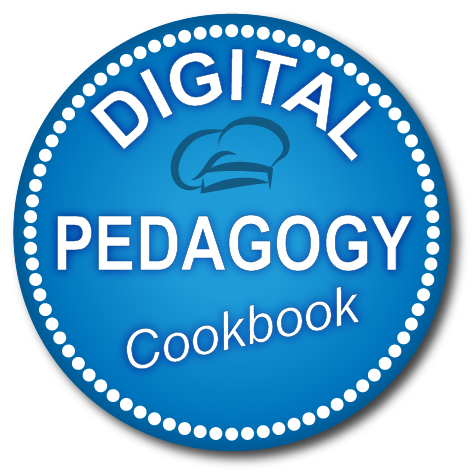Why using a recipe metaphor?
A cookbook to promote and raise awareness about digital pedagogy might be a surprising choice; but think about it: caring to cook a good meal in order to make friends and family happy is something that we all have in common and that have brought people together for centuries.
Approaching this rather conceptual topic in the form of a recipe is an innovative way to make it fun and more accessible to all. Besides, the recipe structure itself is well suited to explore the potential and value-addition of digital applications into regular teaching material just like the secret ingredient that made grandma’s apple pie so special.
The recipe metaphor is also an attempt to lower the “computer anxiety” some educators and trainers may experience refraining them from upgrading their teaching practices. One the one hand, the toolkit provides conceptual basis to understand what is digital pedagogy (Chapter 1) and includes a review of interesting and easy to use applications available on-line (Chapter 10). On the other, the cooking book proposes a selection of teaching recipes where some of these applications have been added as “digital ingredient” in order to demonstrate how they can improve the learning experience. These two manuals are complementary and are intended to give educators and trainers confidence to start implementing digital pedagogy with their students.
There are other similarities between the work of a chef and the work of a trainer: despite diplomas and certifications both of them gain most of their knowledge and skills after long hours spent in the kitchen or in the classroom. Each recipe refers to the DigicompEdu progression scale (Chapter 5) helping educators to self-assess their level of proficiency in digital pedagogy (chapter 8) and to choose the appropriate “digital ingredient”.
Not only does it encourage self-learning but it also gives the opportunity for trainers to further develop their digital competences and to create their own recipe (Chapter 6& 7) according to their teaching subject. On top of referring to the DigicompEdu, the toolkit also presents a review of other digital competences evaluation schemes operating either at national or European level (chapter 9) for teachers and trainers interested in obtaining additional certifications and recognition.
Finally, cooking recipes remain over time because friends and family members like to share them, comment on them, adapt them. On top of these two manuals; on-line communities of practice will be created where educators will be able to share their new recipes, exchange with their peers etc. These communities will also include additional resources (policy documents, videos illustrating techniques etc.) and give opportunities for further learning through social networking.
Extending the recipe metaphor into different media is expected to create a sustainable interest about digital pedagogy within the educator and trainers’circles. The toolkit also emphasizes the transferability potential of the recipe metaphor while establishing a clear parallel between digital skills applied by a teacher in his classroom and the general digital skills needed by any citizen in our modern societies and stated in the Digital Competence Framework for Citizens (chapter 4).
